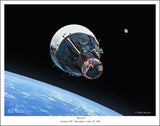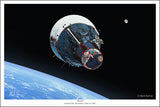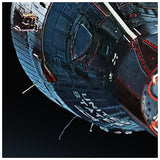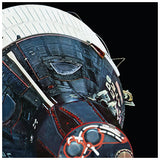Launched on December 4, 1965, Gemini VII was a long-duration flight intended to investigate the effects of extended spaceflight on the human body. This was the first flight for both Commander Frank Borman and Pilot Jim Lovell.
Lasting almost 14 days, the astronauts performed 20 experiments – more than any other Gemini mission. They evaluated various types of food as well as hygiene and collecting their bodily waste as part of the medical experiments. Crew comfort was also explored. Early in the flight Mission Control required at least one astronaut to be wearing a flight suit during the flight. The suit was uncomfortable and hot. After a few days, both astronauts were permitted to remove their suits at the same time which greatly improved their comfort.
The highlight of the mission was the rendezvous with Gemini VIA. The two craft maintained station for 5 hours coming as close as 30 cm. This was the first time two spacecraft had flown so close together in space and confirmed the feasibility of the docking maneuvers that would be required for a journey to the moon.
The mission demonstrated many aspects of spaceflight which would be required for a mission to land on the moon. It set a new record for the longest spaceflight up to that time. The record lasted for 5 years until exceeded by Soyuz 9 in June of 1970. The spacecraft is on display at the e Steven F. Udvar-Hazy Center, Chantilly, Virginia.








